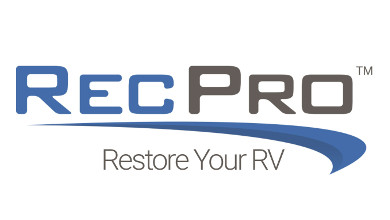Custom Trailer Tents & Shelters for Outdoor Enthusiasts
PahaQue Custom offers innovative trailer tents and shelters to enhance the outdoor experience.
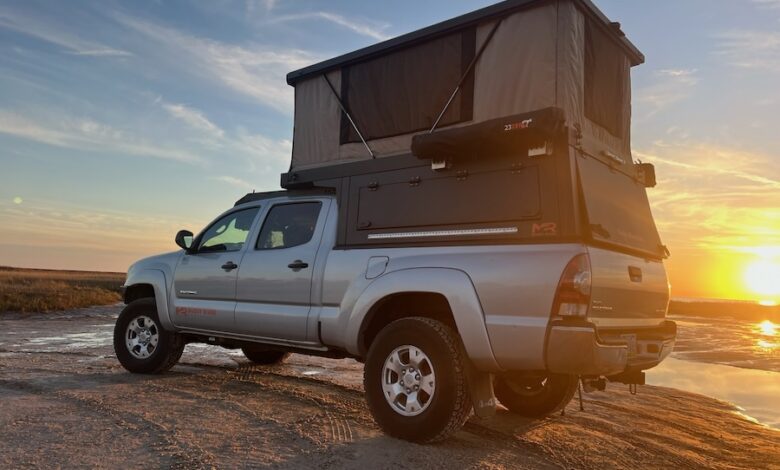
For Jeff Basford, founder of PahaQue Custom Inc., the journey from traditional tent camping to custom shelters for towables was driven by passion and necessity. “I started out backpacking and sleeping on the dirt,” Basford says with a laugh. “But over time, I aged out of that. I wanted something a little more comfortable while still being immersed in nature.”

In 1996, that sentiment inspired Basford and co-founder Mike Greaves to launch a line of family tents that were large enough to stand in and designed for comfort and convenience. This tent line quickly gained traction with major retailers like REI. In 2012, PahaQue partnered with Green Supply in Missouri, a large sporting goods distributor. Following a company restructuring in 2017, Bill Green became partner and chief financial officer for PahaQue.
As competition in the family camping tent space grew, Basford and Green pivoted. Leveraging relationships with brands like Fleetwood Folding Trailers, PahaQue evolved from producing stand-alone tents to engineering custom shelters, awnings and add-ons that enhance the livability of compact trailers such as teardrops and truck campers.
PahaQue’s Growth Strategy & U.S. Expansion
PahaQue initially sourced its products through a Chinese trading partner as it had with its family tents. But as time went on, overseas manufacturing proved increasingly challenging. “You’re tying up a lot of cash, hoping that your crystal ball is clear on what your sales will be,” Basford explains, noting the strain of large minimum orders and lengthy lead times. Unlike their volume-driven tent line, the trailer accessory market didn’t demand the same scale.
The co-owners then made a strategic decision to move production stateside, even though it came with higher costs, Basford says it offered key advantages: smaller batch sizes, tighter quality control and more financial agility.
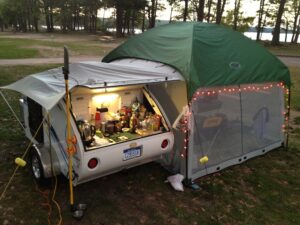 “It freed up a lot of cash that otherwise would have been tied up in large container deliveries from China,” he says.
“It freed up a lot of cash that otherwise would have been tied up in large container deliveries from China,” he says.
PahaQue also carved out a niche by mass-producing the first-ever dedicated shower/outhouse tent for tent and trailer campers. “We called it the Teepee,” he says. “It worked with a porta-potty and solar shower, and it was huge for trailers that didn’t have plumbing.”
What began as a small operation with two in-house models, a fabric cutter and a sewer has since grown substantially. Today, the company employs six full-time sewers, two cutters, and a full packing and shipping department. “We’ve more than doubled in size since we got into it, which represents how the market has grown,” Basford says. “We’ve just grown along with it.”
PahaQue produces about 5,000 products annually across 30 SKUs out of its 8,000-square-foot facility in San Diego, California. But the company plans to add a new 25,000-square-foot building in Missouri, where Green lives.
“Our capacity has exceeded what we can produce in California, so rather than expand here, we’re going to expand in Missouri and take advantage of the opportunities that exist for us there,” Basford says.
The Missouri operation will support the expanding product line, which is driven by a four-person team focused on solving design challenges specific to customer needs.
Making Small Campers Feel Bigger
PahaQue Custom carved a niche with compact trailers by addressing a common problem: limited space.
“Smaller trailers, especially teardrops, are essentially a mattress on wheels,” Basford says. “They’re comfortable and efficient, but they can be limiting in terms of space.”
That’s where PahaQue shines. From visors and screen rooms to full side tents and awnings, its products give campers an affordable way to expand their living footprint — without purchasing a larger RV.
“Our 10 by 10 trailer tent can more than double your available floor space,” Basford explains. “It gives you a bug-free area to store gear, a place for guests to sleep or a space to hang out that is protected from the elements.”
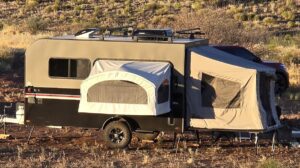 But it’s not just about space. “We are always looking at how we can solve the problems campers are experiencing with their trailers or shelter,” he says. From bugs and rain to UV rays, privacy and storage, the company creates solutions for real-world frustrations. Their product line includes everything from gear pouches and blackout curtains to screen doors, storage covers and tent footprints.
But it’s not just about space. “We are always looking at how we can solve the problems campers are experiencing with their trailers or shelter,” he says. From bugs and rain to UV rays, privacy and storage, the company creates solutions for real-world frustrations. Their product line includes everything from gear pouches and blackout curtains to screen doors, storage covers and tent footprints.
PahaQue’s strength lies in customization, according to Basford. Each product starts with a conversation — often initiated by a trailer manufacturer or end user seeking a solution. The team gathers exact measurements to tailor products to the customer and the trailer itself.
“We work directly with trailer manufacturers to develop products that are designed to fit their models precisely,” he says.
This approach has netted partnerships with trailer brands like Airstream, Bean Trailer, inTech, Helio, Forest River, Aliner, nuCamp, Extreme Outdoors and Off-Grid Trailers.
Tents are crafted from heavy-duty 200- or 400-denier nylon that’s waterproof and UV-resistant. Protective covers are made from 600-denier Magnatuff with a water-repellent finish. “We are very particular about the materials we choose,” Basford says. “Outdoor items that face the elements need to stand up.”
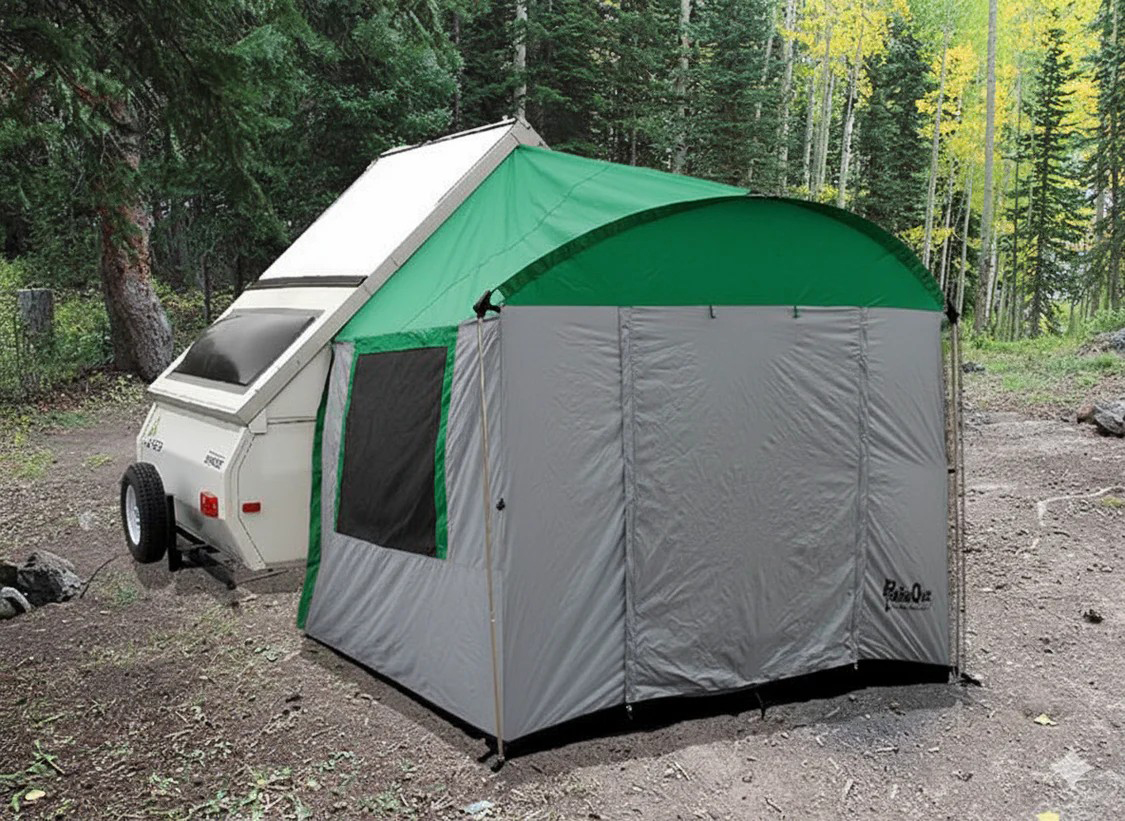 This commitment to quality is backed by a lifetime warranty covering workmanship and materials.
This commitment to quality is backed by a lifetime warranty covering workmanship and materials.
PahaQue products are practical and lightweight — most tent additions weigh under 20 pounds, making them easy to handle without affecting towing or trailer balance. Still, Basford stresses safe use.
“If the wind pushes 30 miles per hour, you need guidelines to secure the tent or to take it down,” he says. “There is a limit to what they can handle, and we try to set realistic expectations.”
The company includes intuitive instructions and how-to videos with its tents. “Not everyone has experience setting up a tent, so we’ve worked to make the process very intuitive,” Basford says.
Future-Focused Designs for Trailer Tents & Accessories
Looking ahead, PahaQue is doubling down on what it does best: solving problems for campers.
“New product design is always at the top of the priority list,” Basford says.
One standout is the Ramp Tent for toy haulers, a patent-pending design that converts the rear of a toy hauler into a fully enclosed, livable room. “We’ve more than doubled the amount of usable interior space in a trailer,” he says. “It gives people the protected, functional room they need — whether for sleeping, relaxing or stowing gear.”
Beyond trailer-specific gear, the company is exploring general-use outdoor products. “Not everything we make going forward will be specific to a trailer make or model,” Basford explains.
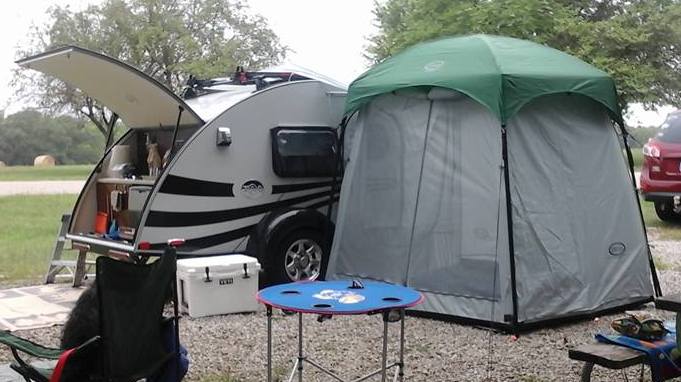 The company is also entering the bedding space. “A lot of trailers come with a 4-inch cushion that’s like laying on cement,” he says. “We are now producing custom-size mattresses, memory foam toppers and slipcovers. These comfort-focused solutions fill a much-needed niche in a market where trailer beds rarely follow standard sizing.”
The company is also entering the bedding space. “A lot of trailers come with a 4-inch cushion that’s like laying on cement,” he says. “We are now producing custom-size mattresses, memory foam toppers and slipcovers. These comfort-focused solutions fill a much-needed niche in a market where trailer beds rarely follow standard sizing.”
PahaQue will use its Missouri-based steel fabrication shop to support small trailer manufacturers with custom frames and components. “There are only one or two large frame suppliers in the U.S.,” Basford notes. “If you’re a small company that only needs 20 frames, the lead times and minimums from big suppliers can be tough. We want to be the company that can make five to 10 frames at a time — or fabricate specific metal parts that help bring your trailer designs to life.”
At the center of all this innovation is a simple philosophy: Campers designing products for campers.
“We’ve been doing this for over 25 years,” Basford says. “We know the market and what customers need. We are also good at listening and creating solutions for unique problems.”
With a passion for off-grid travel and a deep connection to the trailer community, PahaQue continues to embrace growth while staying true to what has made it a trusted name among serious campers.
“We love this market, and we’re excited to keep growing alongside it,” Basford says. “That’s why we’ve refocused all our efforts in this direction over the past 10 years — and we’re just getting started.”

